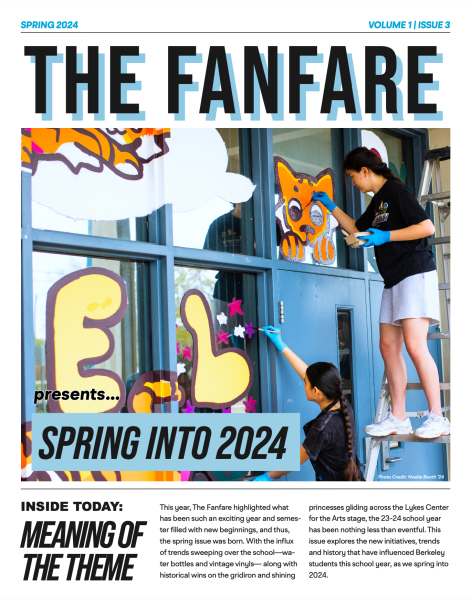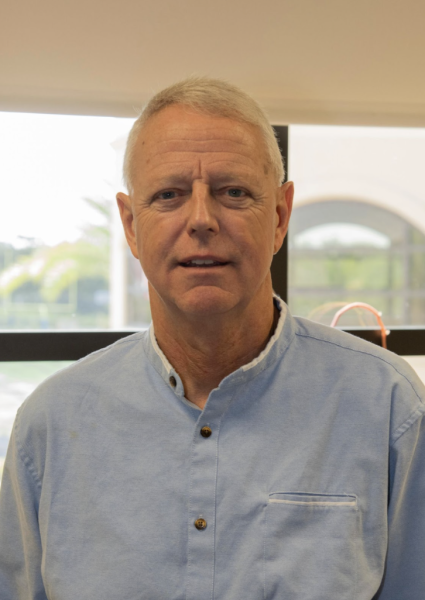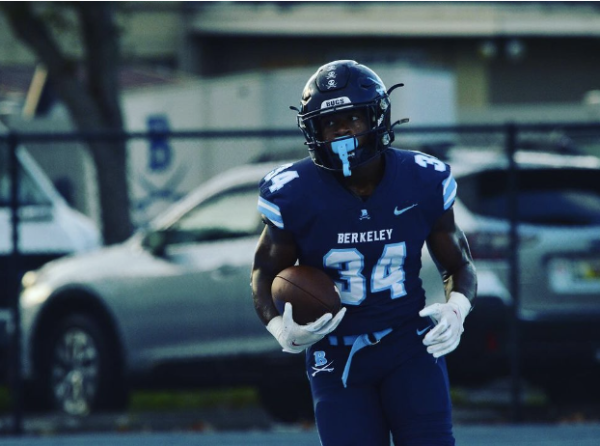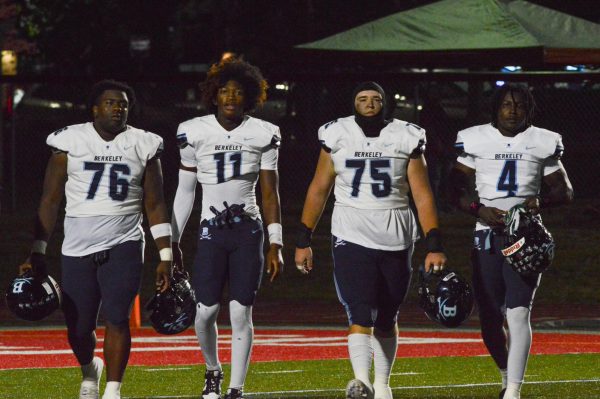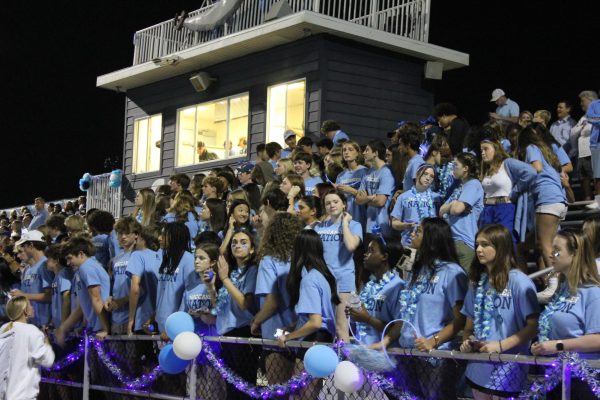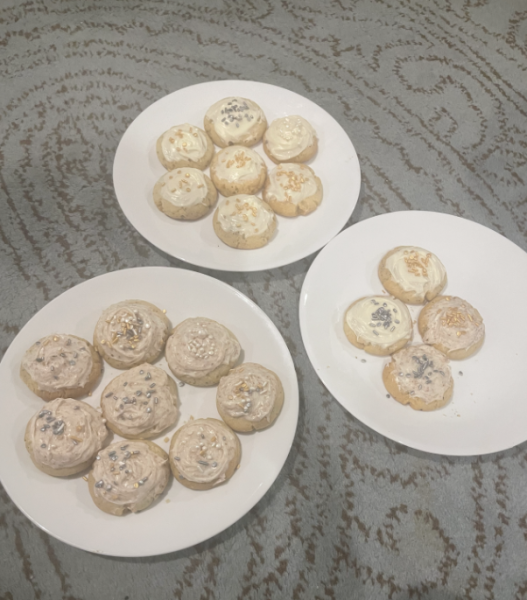Yelverton Urges Students to Continually Expand Their Horizons
Yelverton directs the Class of 2017 to use the luck that they have had for the betterment of others instead of only to continually fulfill their desires.

TAKE RISKS: Yelverton challenges the Class of 2017 to branch out from what they are set on achieving in life.
I am trebly grateful to have the privilege of addressing the class of 2017 this evening because, first of all, it is an enormous honor in and of itself to be asked to speak to such an impressive, dynamic and talented group of young people celebrating the completion of their high school careers. However, it is a far greater honor to be asked to address the very first group of sophomores that I encountered when I came to Berkeley in the fall of 2014. In many ways, we were “wise fools” together (that’s the translation of sophomore, in case you forgot), and in many ways, we “came into our own” together, too—though let’s be frank here, many of you—alright, most of you—clearly outshine me in terms of maturity (Hands on the desk, H Block!). I can’t imagine the school without you—it’s been seriously disorienting in the week since you’ve been gone. I keep walking by the tech commons patio wondering, “Wait, who are these people?” So it seems fitting to me to be a part of the many ceremonies dedicated to wishing you a fond farewell and ushering you into the next stage of your inevitably extraordinary lives.
And finally, being in front of you all tonight feels all the more poignant for the fact that 23 long years ago, I sat exactly where you are sitting—well, not “exactly,” I think it was St. Andrews, but you know what I’m saying—on the brink of graduating from this same institution, Berkeley Preparatory School—the school that made me love learning so much that I could not imagine a more fulfilling life than being a teacher here, devoting my life to learning and helping others develop their intellectual passions, that feeling of “I must know more.” I don’t remember much about my own Baccalaureate ceremony, to be honest, and I don’t even remotely remember who spoke or what they said—and 23 years from now, I’m betting none of you will, either. However, I do remember how I felt that night, and for many nights in that summer of 1994, with the world stretched out so invitingly and terrifyingly in front of me. Like many of you, I was excited, impatient, ready for my “life to begin,” as I saw it, but, like many of you, I was also anxious, nervous, sad at the prospect of leaving behind everything I’d ever known and apprehensive about what the future might hold. I wrote this speech as much for younger me as I did for all of you—it consists of what I wish I had known or been told when I was sitting where you are right now. (Though who knows, maybe that long-ago speaker did say every single thing I’m about to say—like I said, I have zero recollection.)
The first nugget of hard-earned wisdom that I want to share with you concerns the immediate future—this last summer you will have at home with your friends and loved ones before you venture out into the “real world”—or the college version of that world, which you’ll one day realize isn’t quite real, but it’s real enough for our purposes this evening. This summer, while you can, keep your friends and family close—to paraphrase one of my favorite poets, Mary Oliver, “hold [them] against your bones knowing your own life depends on it,” because in certain ways, it does. Most of senior year—most of high school, even—was, if recollection serves, fueled primarily by an “If….then” logic. “If I get an A in this class, then I’ll get into Honors, and if I get an A in Honors, then I’ll get into AP, and if I get into enough AP’s, then I’ll get into the college of my dreams and THEN—THEN!—I’ll be happy.” One of the many downsides to an “If…then” logic is that it posits the present as a mere conditional factor, a stepping stone toward a desired result in a future that never quite arrives. It takes us out of the here and now and diminishes our appreciation of what we hold in our hands at this very moment. If at all possible, treat this summer as a blessed interruption—a treasured interval between where you’re going and where you’ve been, and an invitation to celebrate all the people who have accompanied you this far.
There’s a saying you might have heard, it’s the title of a Thomas Wolfe novel I’ve never read: “You can’t go home again.” What that means, I think, is that just as you can never step in the same river twice, you can’t go “home” again because that home will grow and change in your absence—the people, places and institutions that shaped you must evolve, and when you are all together again, trust me, it will not be the same. And this is as it should be. And yet, these fellow travelers will always be a part of who you are, will know you in ways that no one else does. Only my high school friends can understand how once, on a dare, I drove backwards through a McDonald’s drive-thru (not a good idea, as it turns out—as anyone who has seen me drive can attest, I’m bad enough driving the right way). And only these same people, simply for the lack of anything better to do, could be persuaded to dress up in pajamas and funny hats to roam the aisles of Publix, or to play airport tag when such a thing was still possible, or to write silly songs about a friend’s crush who drove a “Bronco,” about wishing he’d drive by and honk-o. (I know, genius, right? Look out, Weird Al.) I don’t know, maybe we had too much time on our hands, but my point is, you probably have your versions of these same types of antics. You have these friends who know all of your flaws and love you despite or perhaps even because of them. And you have parents who are excited for you but who, like me, do not want to let you go—not just yet, anyway. So this summer, in between shopping for college supplies and stalking your new roommate on Instagram, make sure to turn your sights back to the present. Take full advantage of this rare, organic opportunity to be exactly where you are RIGHT NOW without obligations tugging you toward the future or regrets pulling you back into the past. Be with your friends. Be with your family. Savor these last little moments of being a child, because the chance will not come again.
This brings me to my next piece of advice: just as you should take advantage of this last real summer “at home,” you must embrace the opportunities that will precipitate out of the very air around you once you get to college. And I don’t mean networking, career-advancement opportunities, though of course those will be available, as well. I mean that you will most likely never again in your whole life be around such a high concentration of people who are so invested in growing, changing, exploring and learning—and not for the sake of personal profit or gain, either, but for the joy of the journey itself. On the final page of The Great Gatsby, Nick Carraway mourns how the first glimpse of the “new world” brought mankind “face to face, for the last time in history, with something commensurate to his capacity for wonder.” Tonight, I would like to challenge that statement (with apologies to F. Scott Fitzgerald). You won’t be discovering a new continent when you first trundle onto campus with your life in two suitcases and various poorly organized totes, but you WILL be discovering a whole new world (with apologies to Aladdin). And this new world absolutely can accommodate and even exceed your capacity for wonder.
Any interest you might have been incubating will find a nest in which to hatch; any idea you are interested in exploring will find fertile soil in which to blossom. You will be around other intelligent, curious young people who, like you, are in the most dynamic and transformational period of their lives. You will be around those who will push you to examine your beliefs and question your assumptions, stretch your minds, broaden your perspective and immeasurably enrich your experience of life—that is, if you’ll let them. I firmly believe that, regardless of your grades, the only way you can “fail” at college is by refusing to grow, by instead becoming smaller, narrower, less interested in and less engaged with the world around you. For the rest of your life, you will inevitably face many factors that will make you want to contract, but in these next four years, your job—your primary job—will be to expand—your mind, your heart and your horizons.
Which brings me to my next suggestion, a piece of advice you’ve heard so many times that it has probably begun to feel meaningless: please don’t be afraid to take risks. I don’t mean the endorphin-rush kind of risks like hang-gliding or mountain climbing, though by all means do those things if that’s what you’re into. And I don’t mean risks like sneaking into a foreign embassy, or driving a golf cart down five flights of stairs, or trying to surf on top of a moving car (which is not nearly as easy as Michael J. Fox makes it look in Teen Wolf, take it from me). Those are just stupid risks—though many of you will try similarly idiotic things because, as smart as people are in college, they are somehow also idiots, too. I mean intellectual risks, the kind that push you into new territory and beget entirely new possibilities. Overachievers like every person in this room are at a distinct disadvantage when it comes to this kind of risk-taking for two equally compelling reasons: we have often selected, or have absorbed, paths toward an imagined future that we are afraid to deviate from, and we tend to fear failure, so we often avoid situations that might present unforeseen difficulties.
Personally, I went off to school knowing that I wanted to be an English teacher—I know, crazy, right?—and so I hovered in my humanities comfort zone of history, philosophy, English, comp lit and religion classes. I loved them; I couldn’t get enough of them. And so aside from basic requirements, I took only two courses outside of my discipline: an introduction to quantum physics designed for “poets”—I think that might be a euphemism for something, but anyway—and a seminar on jazz music and history taught by Phil Schapp, a jazz historian and deejay whose shows on New York public radio were the stuff of legend. I dropped the quantum physics class after three weeks, convinced that I was simply too stupid to get a decent grade in the class, and therefore shouldn’t take it. I regret that decision to this day, because believe it or not, I once met Stephen Hawking at a salon near Oxford University where I happened to be working one summer—that’s an ideas-type salon, not a hair salon, in case that needed clarification—and I couldn’t come up with anything to say to him other than, “It’s very nice to meet you, Mr. Hawking,” before I sheepishly shuffled away. (Who knows? I could have been the third Mrs. Hawking by now.) As for the jazz seminar, I wasn’t even signed up for it. On a whim, I tagged along with my best friend to the first session and kind of weaseled my way in, Eddie Haskell style. I stuck with the course despite discovering, much to my surprise, that I have a tin ear—I can’t tell the difference between a “blues” and a “jazz,” which apparently is kind of a critical distinction for jazz scholars. I wasn’t great at it, in other words—my lowest grade in college was in a jazz seminar, what can I say, my parents were thrilled—but nevertheless, the course ignited an intellectual passion. I wanted to learn everything I could about the cultural and artistic production associated with the African diaspora. I read, watched, viewed and listened to everything I could get my hands on, amassing a rather impressive record collection along the way. For a long time, I treated this interest as a hobby, but when I eventually decided to pursue my doctorate in English literature, I dedicated myself to this area of study. Given how much this one “accidental” course influenced the trajectory of my life, I deeply regret playing it safe during a period when there was so much more I could have been learning and discovering. I share these stories in hopes that you won’t make the same mistake. I want you to branch out, to veer even slightly from the narrow path no matter how determined you are to arrive at a set destination. If you have a calling, by all means, honor it—you’d be a fool not to—but still, follow an interest, a curiosity or even a question into unfamiliar territory because you never know—you might get lucky. Some miracle of cross-pollination might send you toward that same destination with renewed vigor and purpose, and with a broader sense of what is possible.
The concept of luck brings me to my final point. In his own Baccalaureate address, Michael Lewis, the author of Liar’s Poker and Moneyball and a man who knows a little bit about luck, advised the Princeton University class of 2012: “Don’t be deceived by life’s outcomes… life’s outcomes, while not entirely random, have a huge amount of luck baked into them. Above all, recognize that if you’ve had success, you’ve also had luck. And with luck comes obligation. You owe a debt, and not just to your gods. You owe a debt to the unlucky.”
Lewis goes on to share a story about a pair of researchers from UC Berkeley who performed a study in which they grabbed random students and divided them into teams segregated by sex—teams of three women, teams of three men. A leader for each team was arbitrarily designated, and each team was asked to solve some complicated moral problem—what to do about cheating, for example, or how to handle drug abuse on campus. Exactly thirty minutes into the problem-solving session, a researcher would enter the room with a plate of four cookies—one for each member of the team, plus one extra, just kind of hanging out. This should have been an awkward situation, but according to Lewis, with incredible consistency, the arbitrarily appointed leader of the team grabbed the fourth cookie and ate it—ate it, as he put it, with “gusto.” These leaders had done nothing special to gain their positions—they had been chosen at random, for no reason at all, thirty minutes earlier—“their status was nothing but luck,” as Lewis explained. And yet, they were left with a feeling of entitlement—this fourth cookie belonged to them, they deserved it. The moral of this story, according to Lewis? “This is how people behave when they are blind to their own luck”—when they believe they deserve to profit arbitrarily—at the expense of those around them, to be sure, but more chillingly, at the expense of invisible and untold others.
And why is this relevant to you? Because like it or not, you are among the lucky few. To only slightly paraphrase Lewis, you are “lucky in your parents, lucky in your country, lucky that a place like [Berkeley] exists that can take in lucky people, introduce them to other lucky people, and increase their chances of becoming even luckier.” You are “lucky that you live in the richest society the world has ever seen, at a time when no one expects you to sacrifice your personal interest to anything larger than yourself.” Already, you’ve been faced with the chance to take the extra cookie many times, and inevitably, you will be faced with that chance again, and again, and again. Don’t be that person who mindlessly believes that all the cookies by divine right belong to her. Now more than ever you are constantly being bombarded by the message that it’s all about you—that the definition of your success is the gratification of your needs and your desires no matter how limitless those desires may be. And believe me, desire is limitless. If you define success in this way, you will never truly feel successful because you will always want more. Furthermore, if you define success in this way, it could enable you to pursue personal gain while causing the suffering of others—people you’ve never even met, whose existence you probably aren’t even aware of. Use these next four years as an opportunity to educate yourself about the national and global problems that need solving NOW—perhaps you’ll find a way to combine your personal success with the development of a solution to one of them. To truly make a positive difference in the world, you must find a way to share your luck in whatever way you can.
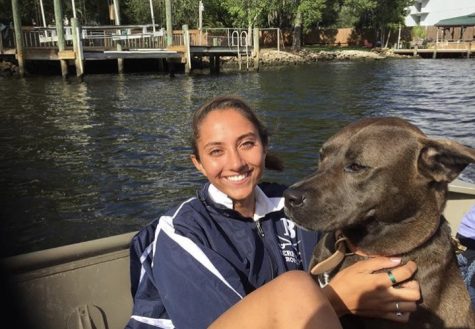
Nina Pastore, the Fanfare’s Head Editor of Photography, has been a Berkeley student since 2007. When away from her camera, Nina can be found practicing...


